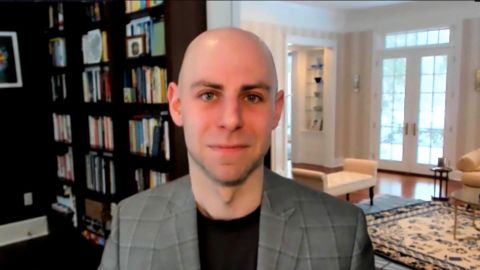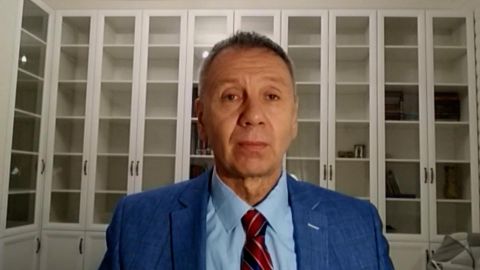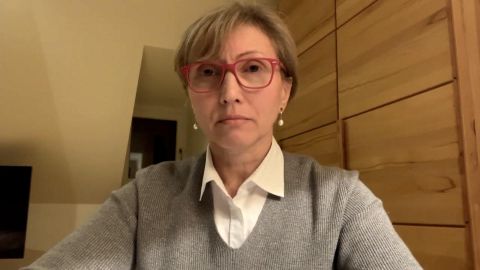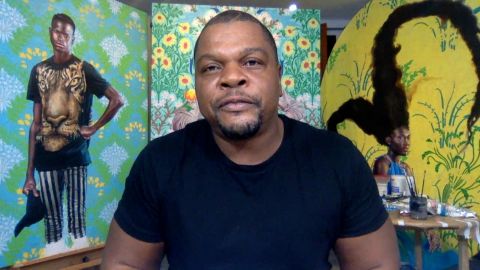Read Transcript EXPAND
CHRISTIANE AMANPOUR: Now, here’s a question, in our world of tribalism and echo chambers, it is possible to unlearn firmly held beliefs and opinions? Adam Grant is an organizational psychologist who explores how to navigate discussions with people that you disagree with. His latest book is called “Think Again: The Power of Knowing What You Don’t Know.” And here he is talking with our Walter Isaacson talking about steps to bridging these divides.
WALTER ISAACSON: Thank you, Christiane. And, Adam Grant, welcome to the show.
ADAM GRANT, AUTHOR, “THINK AGAIN”: Thanks, Walter. Great to be here.
ISAACSON: So, you have this great new book “Think Again” and the point of it is that people who are really good leaders they aren’t just the smart ones, they are able to pivot, they are able to rethink things. Give me an example of how you would use that to get people to rethink vaccines, because there are so many people, it seems, who are resistant to getting the vaccines.
GRANT: Yes. I think that we should start with what doesn’t work. We know that when we try to convince other people to open their minds, our instinct is to become preachers and talk about why we are right or prosecutors and try to make it clear that the other person is wrong, and that just makes them defensive. I think what we want to do instead is show a little bit of humility and curiosity and say, look, I would love to know what your concerns are, as well as whether you have any reasons to consider a vaccine. And I think we have seen a lot of people who are hesitant because they feel like it is a threat to their freedom. And one of the things I would do is I would actually reframe the vaccine as a source of freedom, to say, look, if we can get enough people vaccinated, we can recover from this pandemic.
ISAACSON: That is interesting, because you are framing it in ways that says, you should not just think about what it will do for yourself but what it will do for everybody else and give them freedom. Does that work better than appealing to somebody’s self-interest?
GRANT: It seems to. My colleague, Dave Hoffman (ph) and I actually did some experiments years ago in hospitals where we were trying to get doctors and nurses to wash their hands. And we found that reminding them that that would protect them from getting diseases did no good whatsoever. But when we said, think about vulnerable patients, they actually become more likely to wash., And there’s been some evidence around COVID that, at least in March, encouraging people to think about not spreading it was actually more effective than getting them to think about not getting it. And, Walter, one of the big reasons for that is we are all vulnerable to an illusion of invincibility. I don’t believe that I’m going to get sick. I don’t want to believe that I am going to be at risk. Whereas, with other people, particularly the vulnerable population, I recognize that, yes, you know, this might be dangerous. So, I think doing it for grandma is one of the more effective arguments that we have.
ISAACSON: And you have a friend who has been anti-vax for a while and you almost lost your friendship, but then you applied your new methods and you’re going to restore your friendship and open both of your minds, right?
GRANT: I think we did both become more openminded. So, one of the first things I learned was he didn’t want to be identified as anti-vaxxer. He said, look, I try to look at this in a way the pros and cons for me and my family, and my views are a lot more nuanced than that, and that was a lesson for me to say, you know what, whatever your stance is, it is probably not always going to fall under one label. And I think my biggest breakthrough in conversation was just to say, look, you know, I know there are probably some situations where you’d be more and less likely to consider a vaccine. What would lead you to say maybe? And he said, well, you know, if I were in an area with a major outbreak, I would definitely at least look at the evidence. And I never heard him admit before that he was even open to the possibility. So, I don’t expect him necessarily get any vaccines anytime soon, but it was a mark of progress.
ISAACSON: One of the amazing things that you pulled off was getting the Red Sox fans to not hate the Yankees? How did you do that?
GRANT: Well, that might be a high bar. But my colleagues and I tried a couple of approaches that did not work. So, I ran a couple of experiments with Tim Condrio (ph) early on where we said, let’s humanize a fan of the opposing side. So, you know, if you are a Red Sox fan, let’s think about all of the great attributes of Yankee fans, totally ineffective. Right. People just said, well, that person, you know, routs for the wrong team. And then we tried to give them a common identity as baseball fans, and they said, yes, but I understand we both love baseball, unfortunately, they are on the ugly side of this debate. So, I can’t get on board with that. What was effective was when we got them to think about how their allegiance to a team was actually malleable, that it’s not something that was innate or fixed. So, we said, hey, Red Sox fans, who would do you think you would rout for if you had been born in a different city? And we did the same for the Yankees’ fans, who said, hey, if you grew up in Boston, who do you think would be your favorite team? And as they thought about that, they actually felt less animosity toward the other side, they were more willing to wear the opposing team’s jersey, they were less likely to try to sabotage fans of the rival team by preventing them from getting a bonus in their study. And I think this idea of counterfactual thinking is something that we should all invite a little bit more often, saying, you know what, a lot of the beliefs and opinions that you hold are actually a product of your life circumstances and maybe even your upbringing. And once you understand that, you realize, you know what, the group that someone belongs to, it doesn’t actually tell you everything about who they are. And we have recently extended this to gun rights and gun control advocates and found that a very similar technique was effective, that when we got people who are very strongly in favor of gun rights to think about what attitudes they might hold if they had grown up in Columbine, they actually become more open to hearing the other side and have less animosity toward them.
ISAACSON: What’s your advice or debating somebody with polar opposite views from you, especially if they had fallen down the rabbit hole and believing all sorts of conspiracy theories?
GRANT: I don’t think it’s ever going to be easy, but I think part of the problem is that we see it as a debate, which means we’re supposed to argue with the person and even maybe bully them into changing their mind which obviously is just going to increase their resistance. I think we know there are a few steps that seem to be more effective than that. The first one is to start with areas of agreement, figure out whether there’s any areas of consensus that exists between your views. Because usually when you’re disagreeing it’s on complex issues and there might be a couple of areas where you are actually on the same page. So, let’s say it’s on guns, for example. We know the vast majority of Americans, whether they are pro-gun rights or pro-gun safety, they support universal background checks. And so, I might start the conversation there. And then you’re dealing with somebody who really is believing in conspiracy theories, I think you can make more progress by asking them questions than giving them answers. So, I have been reading a lot of the research on this, and I had a friend who is actually believing in some government conspiracies and I decided to strike up a conversation. And instead of immediately trying to debug them, I just said, well, how would that work? Can you explain to me how in the world this government that you think is completely incompetent, by the way, has managed to pull the wool over everybody’s eyes on an issue like vaccine safety? And it was a very interesting conversation because instead of me trying to attack and him going into defense mode or attacking back, what he was doing was actually thinking creatively and saying, well, how would I pull off a conspiracy like that? And again, I said, look, some conspiracies theories are real, right. I think for a while Watergate was a conspiracy theory, that turned out to obviously be a huge problem for America. But what I want to understand better is how we know which conspiracies we should take seriously and which ones we should be a little bit more skeptical of. The lesson I took from the research on this, Walter, was why questions, asking people why they believe what they believe just gives them a chance to make a long list of reasons to stay where they are. Whereas asking them how question, how would this work, how did somebody actually orchestrate this, how would you pull this off, it makes them realize their gaps in their knowledge and it helps them see the complexity of the issue which makes them a little bit less polarized typically.
ISAACSON: How could you reduce the total amount of polarization that we have in our society especially when social media seems to do the — encourage the opposite of what you recommend, it encourages people to engage and fight and preach and prosecute as opposed to understand each other?
GRANT: Well, ultimately, we need to approach our conversations differently. And I think a lot of the time, if we talk about political polarization, people are diving into these conversations, basically making the arguments that they themselves would find convincing as opposed to understanding what somebody else might find appealing. So, let’s take Black Lives Matter for example, anti-racism. Very often, the movement is framed in terms of liberal values, like equality or justice. And I think there’s a missed opportunity to appeal to conservatives by saying, you know what, we believe that everybody deserves freedom. Freedom from oppression as well as freedom of opportunity. And I think that just thinking about, what are the values that might be relevant to the other side or even crosscutting means you don’t have to change the other person’s values, you can actually appeal to values they already hold.
ISAACSON: Our response to this pandemic as a nation has been pretty weak at times. To what extent does that cause the leadership’s inability to rethink or repivot when new information came out?
GRANT: It’s been frustrating to watch as somebody who spent a lot of my career studying the importance of rethinking. I’ve watched a lot of leaders prefer the comfort of conviction over the discomfort of doubt. And I think it’s not a coincidence that when we look at leaders like Jacinda Ardern, a lot of people are celebrating the confident humility that she brought to the table, right. Saying, look, you know what, we actually don’t know how to stop this virus. We don’t know yet how deadly it is very early on. And so, we’re going to take what may seem like extreme measures. And as we learn, we may evolve our stance. And I think we have obviously seen the benefits of that approach, if you at the — you know, the ability of New Zealand to limit the spread of the virus and how well they’ve been able to maintain a functioning society in the face of that. So, I’d love to see more leaders adopt that stance. And, Walter, for me, confident humility is recognizing that it’s OK to admit what you don’t know, and sometimes that is a source of confidence or a signal of confidence, right. I have to really believe that I know what I’m doing to say, you know what, we’re not sure yet, but I believe we have an incredible team here and we’re going to try to figure it out together.
ISAACSON: You say that one way to create leaders that can pivot and rethink is to have, what is it, a challenge network, I think, is the phrase used, a challenge group around them. Explain if you were advising President Biden now how you would create a group around you to make sure he was always able to pivot and rethink.
GRANT: Well, I’d probably start with a page out of the Lincoln playbook and say, a team of rivals is a great way to, at least, put the odds in your favor of hearing arguments that you wouldn’t think of maybe even ones that you disagree with. I think what you want to start with though is really to recognize that the group you’re going to assemble around needs to be willing to experiment. They need to recognize that whatever opinions they hold about effective policy, those are actually hypotheses, right. And if think like a scientist, those are hypotheses that need to be tested. That means you want to go out and run experiments and gather data to try figure out, OK, this policy that I’ve been passionate about, is this actually effective or not? I don’t know yet. Let’s see what the evidence shows. And I don’t know, as a social scientist, it is hard to imagine ever really trusting a leader who doesn’t put evidence ahead of opinion.
ISAACSON: President Biden is now faced with the question of whether or not he can help unify, bring people together, and specifically over a COVID relief bill and stimulus bill, whether it’s best to try to work with Congress or whether it’s best to drive through. In your own research and all, what do you think would be the things President Biden ought to be thinking about now as he weights that decision?
GRANT: Well, as an organizational psychologist, I am not sure I’m qualified to answer that question, right. I’d probably want to turn to somebody with real expertise in policy and political science. I do think though, when it comes relationship building, there’s been a lot of debate about respect, and whether, you know, President Biden should respect people who spread lies about, you know, his success in the election or who stood against him. And I think there’s a distinction that is very relevance here. Kristie Rogers (ph) and her colleagues have studied the difference between what they call owed respect and earned respect. And they would say, look, owed is just the dignity that you deserve as a human being, and that is a fundamental right that everyone is entitled to. Earned respect is saying, you know what, I don’t necessarily have to listen to all of your arguments if I don’t believe they are credible. And I guess if I were President Biden, the first thing that I would do, which is seemingly something that he has a long history of doing is offer everyone owed respect, and then say, here’s what you can do to earn my respect. If you are willing to put the country above your party, if you’re willing to put your principles above your politics, if you’re willing to put truth above pride, then that’s how you earn my respect and you’ll end up with more of my support that way. It’s hard to imagine that that wouldn’t be a constructive conversation to have.
ISAACSON: You know, I sometimes, I think followed your formula, which is I always challenge my assumptions, I always doubt. You know, I wake up in the morning and don’t agree with the opinions I went to bed with. But somehow, I think that’s made me a less good leader of big organizations at times, it’s paralyzed me a bit. How do you prevent it becoming paralyzing when you are questioning your own beliefs?
GRANT: Oh, that’s interest. I think it’s actually a common experience for a lot of people to say, look, if I am willing to be intellectually humble, if I’m curious, if I’m full of doubt, then I might never act. I think probably the best antidote to that problem I’ve seen is from Bob Sutton’s research at Stanford. Bob describes an attitude of wisdom as basically saying, look, I’m going to act on the best information I have while continually questioning what I know. And actually, had an interesting conversation a couple of years ago with Jeff Bezos about this. Whether you love or hate Amazon, I think Jeff obviously has demonstrated a pretty impressive track record of leadership in terms of changing the way that we all can see him. And I wanted to understand how he makes decisions and avoids paralysis. And he said, look, if a decision is highly consequential and irreversible, I will wait as long as possible, even procrastinate until I have the best information, because it really matters and I’m not going to be able to undo it. But if the stakes are lower or I can change my mind, then I’m going to act as quickly as I can and treat it as a gamble. And then, whatever I learn going forward, I have lots of time to rethink that decision. And I think just drawing that two by two and asking yourself, how important is this decision, how irreversible is it, that that’s a good guide for figuring out, OK, should I be paralyzed for a little while or should I just act quickly?
ISAACSON: People like Malcolm Gladwell and others have done experiments where they talk about the importance of — you know, in Blink, the importance of going with your intuition, sticking with it as opposed to rethinking things. How would you modify that theory?
GRANT: Oh, I think that the common advice is trust your intuition. My recommendation would be test your intuition. Walter, when I think about intuition as a psychologist, I think about it as subconscious pattern recognition. And open question is whether the patterns you’ve recognize in the past are relevant to the present situation you’re in. And so, I think what you want to do is ask yourself, OK, is my experience in — you know, in whatever domain I’ve had going to apply to the current circumstances? And if the answer is yes, by all means, you can follow your gut. But I want to know where that gut is coming from and whether it’s leading you in the right direction.
ISAACSON: One of the arguments for free speech in our society has been that if truth and falsity have fair play in the battleground of ideas that truth will win out. But now, people — some people have started to argue and try to push back, even censer or at least cancel certain people and try to restrain free speech because they say it’s dangerous. How would you argue that?
GRANT: Well, I think in the long run, we can all hope that the marketplace of ideas is efficient. But it doesn’t mean it’s going to be efficient day by day or year by year. And I think there are certainly steps we could take to make it more efficient. The place I would start is to really separate out the freedom of speech from cancel culture, right. I don’t think that we need to cancel a person because we disagree with their views, but I also don’t think that people should be shielded from criticism if they express views that are hateful or that are clearly inconsistent with the best available evidence and facts that we have. And I think there have been a lot of people crying cancel culture and saying, my rights have been taken away, and when you look at that, you said, no, there’s not a right to be able to say whatever you want even if it hurts people. There’s a right to holding an opinion, and if that opinion is something that people find objectionable or incorrect, then, you know what, they should be able to correct it. And so, I think, I guess, I would say we need a more nuanced conversation about free speech and cancelling and I don’t think we’re going to get anywhere by crying cancel culture anytime somebody disagrees with you, right? Disagreement is how the marketplace of ideas works and I think we need to hear a variety of perspectives as long as those perspectives are grounded in a good faith attempt to move a conversation forward as opposed to trolling or as opposed to tryin sow some kind of discord.
ISAACSON: Adam Grant, as always, it’s been fascinating. Thank you so much for joining us.
GRANT: Thank you, Walter. This was a delight.
About This Episode EXPAND
Former Russian Member of Parliament Sergey Markov reacts to opposition leader Alexey Navalny’s jail sentence. Marina Litvinenko, widow of Russian dissident Alexander Livinenko, explains why Navalny’s arrest is very personal to her. Artist Kehinde Wiley discusses Black Lives Matter. Psychologist Adam Grant gives tips for bridging divides.
LEARN MORE



